Good Energy for Grownups: All In! — Identity and Belonging Page
0

Level 3/5Flash BoltonClassroom bot
3
Loading
1
Watch this video to
earn a point for your champ!
Join in on a candid conversation about identity and belonging for children and students of all abilities, presented by Special Olympics Unified Champion Schools (R).
[MUSIC PLAYING] Welcome to Good Energy for Grown-ups, All In with Special Olympics Unified Champion Schools. I'm Tajha, a former US Youth Ambassador with Special Olympics North America. Today, we're discussing identity and belonging with some special guests. Hey, Kaleigh, can you please introduce yourself, please? Of course. I'm Kaleigh Gardner. I am a former middle level educator focusing in literacy and special education, and I am currently the education advisor for Special Olympics Unified Champion Schools. Sophia, can you please introduce yourself? Sure. I'm Sophia Arnold. I'm a high school special education teacher. I teach students with a range of intellectual disabilities. I'm a GoNoodle teacher ambassador and a mom of four beautiful children. Well, I'm so glad to have both of you here today. Well, what does identity and belonging mean to you? I think we just want to quickly say it's who we are, but it's so much more than that. I think when you really break down identity, it is made up of our seen and our unseen identities, right? Like, what we look like, the things that we do, but it's also a lot about our interests, our abilities, and our values. Yeah, and you can think of it as a recipe. A recipe has different ingredients. We have different things that we like, things we don't like, our culture, favorite activities to do. When all of those things come together, it makes up who we are, and I think that's a great way to explain it. Perfect recipe. Yeah, I love that. I think that's probably one of the best ways to explain it, especially for younger kids, like, actually putting those things together. Belonging is more of this-- more of like a feeling. I think it's hard to describe. So I think the best way to introduce it for students and for children is belonging is a sense you feel when you are respected, when you feel safe, and when you feel secure. And I think a lot of that stems from you need to know who you are, and others need to respect and know who you are to make you feel like you belong. Why are these topics so important to discuss with children and students? I think it's very important because, eventually, our goal as educators and parents is to integrate our children in society, right? If we give them the right tools that they need to be kind, and aware, emotionally aware adults, then I think they'll contribute to society, and that's our end goal. Yeah, I definitely agree with that. I also think it's important because, especially in the classroom, we want our students to thrive. We want them to be successful, whether it's academically, it's emotionally, mentally, behaviorally. We want to see growth, and I think that one of the best ways to reach that growth is to make them feel safe and secure. They need to know that they matter, and they can feel safe in their classroom and in their school and, of course, in their home. So, now, what are some takeaways for the teachers, students, and parents? For teachers, I'll just say creating the opportunities for your students to feel like they belong. Again, setting that foundation, making sure you're intentional. You have to be very intentional, especially in the beginning of the year. I'm just one of those teachers who feel like, if you set the tone and do all the work in the beginning of the year, the remainder of your school year would be a bit easier. So I just think the intentionality of accepting all students for who they are and teaching them and modeling how to accept your peers for who they are. And I think, for students-- and Tajha, I would love to hear your perspective-- but I think for students of all ages, the main takeaway is just to have that awareness of I am me. I have control over my own identity. I'm learning what makes me who I am, but then also just having that respect for others to do the same. I feel like, as a student or as a leader, we're always like, oh, I want to be like that person. Oh, I want to be this person. I wish I was just like that. But then we start realizing we're looking, and we're like, wait, no, I'm different. I have an identity, and once I'm able to find that identity, that's what makes me who I am, and that's something that I have to live with. It's something that I actually love about myself is being me. And once the little kids and students, they find out their identity and who they really are, it's going to change their life forever. They're no longer going to want to be like anybody else but themselves. [MUSIC PLAYING]
